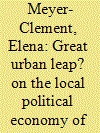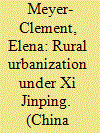| Srl | Item |
| 1 |
ID:
173249


|
|
|
|
|
| Summary/Abstract |
Since 2014, under the policy of ‘new-type urbanization’ (新型城镇化), Xi Jinping’s government has worked towards a more sustainable form of urbanization. One important aspect of this policy shift is a more balanced development between cities and rural areas, which is intended to improve the living conditions of both rural migrants in the cities and the rural population in the countryside. These goals are not new. For example, political attempts to stimulate small town development reach back into the 1980s. Over the last decade, however, the degree and comprehensiveness of party-state control of urbanization in the countryside have clearly increased. Against the backdrop of the latest policy developments, this special issue of China Information examines how the politics of ‘rural urbanization’ has changed in China and what the implications of these changes are for rural governance and the rural population. The term rural urbanization refers to the different processes and practices of urbanization that affect areas and people classified by the state as rural. The articles trace these processes in rural and peri-urban areas as well as among rural migrants in Chinese cities.
|
|
|
|
|
|
|
|
|
|
|
|
|
|
|
|
| 2 |
ID:
145130


|
|
|
|
|
| Summary/Abstract |
This paper provides insights into the local political economy of China’s current in situ urbanisation as compared to the 1980s and 1990s, focusing on the role played by county and township governments in shaping urbanisation in their localities. Marked differences were observed in the extent to which local cadres are able to steer the urbanisation process and adapt the relevant policies to local conditions and demands of the population. If leading county and township cadres are able to assert a relatively autonomous position vis-à-vis the superior municipality, a rural urbanisation process that considers both urban and rural interests and integrates local economic initiatives seems to become a potential alternative to the prevailing city-centred urban expansionism.
|
|
|
|
|
|
|
|
|
|
|
|
|
|
|
|
| 3 |
ID:
173251


|
|
|
|
|
| Summary/Abstract |
‘Rural community building’ is one of the most prominent policies of rural urbanization and village renovation in China. Since the nationwide implementation of this policy within the scope of the programme ‘Building a new socialist countryside’, the large-scale construction of new residential complexes has accelerated the transformation of the country’s rural landscape. However, extensive demolition and relocation have drawn increasing criticism, and the policy has become synonymous with the seizure of rural land resources by local governments. When Xi Jinping came to power, the new leadership initially appeared to abandon the policy but has eventually revived it. This article studies the implementation and evolution of the rural community building policy as a case of policy learning. The analysis of national and local policy documents and implementation practices in four provinces highlights a new framing of the policy, more intensive hierarchical controls over rural land use, and the state’s increasing reach into village governance, as well as new incentives for local governments to continue with demolition and relocation projects. These changes reveal a mode of policy learning in the context of an authoritarian regime whose goal is to improve policy implementation in the face of growing public criticism and social tension.
|
|
|
|
|
|
|
|
|
|
|
|
|
|
|
|